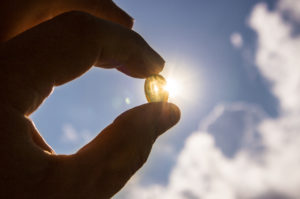 You need strong bones if you want to prevent falls and fractures. You especially need them if you don’t want to live with the risk and pain of osteoporosis.
You need strong bones if you want to prevent falls and fractures. You especially need them if you don’t want to live with the risk and pain of osteoporosis.
Of course, you might think you’re on the path to prevention. Maybe you’re lifting weights and getting exercise. You’re eating protein and a diverse, balanced diet rich. You’re getting your dietary calcium and even taking a calcium supplement just to be safe.
Advertisement
All your bases are covered, right?
Not exactly. You need one more thing to tie all of your efforts together. You need the bone “hormone.”
Unfortunately, you can’t get it from most foods. It’s only available in small doses in fish, mushrooms, and eggs. It’s vitamin D, and it’s essential in the growth, formation, and maintenance of strong healthy bones.
You might be surprised to learn that vitamin D is a hormone. In fact, it’s a prohormone. Unlike other vitamins, only about 10% of what you need comes from food (which is a good thing, because it is not found in sufficient amounts in any foods).
Instead, it is manufactured in the kidneys and released into the body where it is responsible for building a healthy immune system and controlling calcium absorption and concentration. But there is one caveat: to make vitamin D, you need sun exposure.
When sunlight hits your skin, your body starts manufacturing vitamin D. And that’s great when it’s not winter. But when it’s not warm and the sun isn’t shining, it’s hard to get the stuff. That means that despite your best efforts, you might not be maximizing bone health.
Without enough vitamin D your bones are not absorbing the calcium you’re trying so hard to eat. Vitamin D works to control blood levels of calcium, making sure it’s not too high and being absorbed into the bone where it’s stored.
When vitamin D is deficient, calcium is not being absorbed and your bones will not regenerate adequately. It may seem strange, but bones are constantly in flux. They release calcium for other bodily functions and then take in calcium to build new bone.
Advertisement
Aside from giving you structure, bones are essentially storage cabinets for calcium.
It’ s a never-ending cycle when calcium and vitamin D requirements are being met. Bone is lost and regrown. But when you’re not getting enough of these nutrients, you lose bone and it becomes weaker. The risk for osteoporosis, falls, and fractures go up.
Getting adequate vitamin D—the bone hormone—is a major key to maintaining strong and healthy bones. Now that you know how it all works you can make it a priority in your daily routine.
